Excavation Contractors Columbia
Top 10 Excavation Services in Columbia
Get 3 FREE Land Excavation quotes for your project today! Compare profiles, reviews, accreditations, portfolio, etc... and choose the best service.

J.G Gagnon & Son's Excavation L.L.C
44 reviewsEpping, New Hampshire, United States, USJ.G. GAGNON & SON’S EXCAVATION L.L.C. We take pride in all the jobs we do. With 30 years of experience and pristine work ethics, we give every customer and job 200%. We have a passion, not only for the excavation work itself but, for our customers and their satisfaction! We treat and tackle every job as if it was our own. We take extreme pride in our finished product, always leaving our customers completely satisfied. We’re a small business located in Southern NH and offer services in -
- Services
- Why Us?
- Gallery
Get Quote
Always Underground Inc
3.316 reviews20603 Burl Court, 20603 Burl Ct, Joliet, 60433, USBuilding Trust with Quality Work Respected for our integrity, Gold Shovel Standard certified for safety About Us AUI is a full service Woman Owned Business, design build utility construction company specializing in wireless /wireline, aerial and underground projects. With over 60 years of experience AUI has been providing 24/7 emergency response to the most challenging of projects. Our design, build, turn-up and test teams are well positioned throughout Illinois, Indiana, Wisconsin, Michigan, Iowa, Ohio, Kentucky and eastern Missouri to be able to assist now. Our emergency response crews have mobilized to support storm damage and other natural disasters for decades. Please see our Services tab and check out our capabilities Working Together We offer an end-to-end client experience that includes seamless communication, budgeting, staffing, on-site organization, and solid, quality construction every time. Our relationships with over 80 jurisdictions in the Midwest provide our clients peace of mind their projects will be completed on time and on budget. Why Choose Us? We work with all stake holders to bring quality, infrastructure Projects to life. Call us today and bring our project management skills and extensive construction experience to your next project.
- Services
- Why Us?
- Gallery
Get Quote
Wilder Excavating LLC
52 reviews126 Kennedy Brook Drive, Stoddard, 03464-4514, USWelcome to Wilder Excavating! Located in Southwestern NH, Wilder Excavating is a locally family-owned business serving the Monadnock Region and surrounding areas. We work with both residential and commercial customers. At Wilder Excavating, we take great pride in our hands-on experience, expertise, quality, and customer service. It is our mission to provide excellent workmanship and complete customer satisfaction from the start to finish of your project. We understand every customer has different needs. We take time to meet with you, evaluate your project and give you options based on your needs and budget. We take great care to work and communicate with every customer in a professional manner. Our reputation is based on service, safety, and quality, regardless of how large or small the job. Ben from Wilder excavating is nothing short of a solid human being. I have used them multiple times for material sourcing, material delivery, heavy equipment trucking, and advice so I can plan for future projects. Never once was there an issue with any of our interactions regardless of the amount of money changing hands. I recommend them to anyone I know in the region that needs their many services. - Eddie FREE ESTIMATES Need a new lawn, driveway, culvert, septic system … or something needing an excavator… and have no idea what to budget? We are happy to come to you to evaluate the job, and give you pricing… with NO OBLIGATION on your part to hire us for the job. Depending on your needs, we will often give additional options… which you may not have thought about to make the end project better and still be within or under a price range that will fit your budget. We stand behind our work and our pricing. Financing options are available for qualified individuals, if needed. Call for a FREE ESTIMATE (603) 313-5591
- Services
- Why Us?
- Testimonials
- Gallery
Get Quote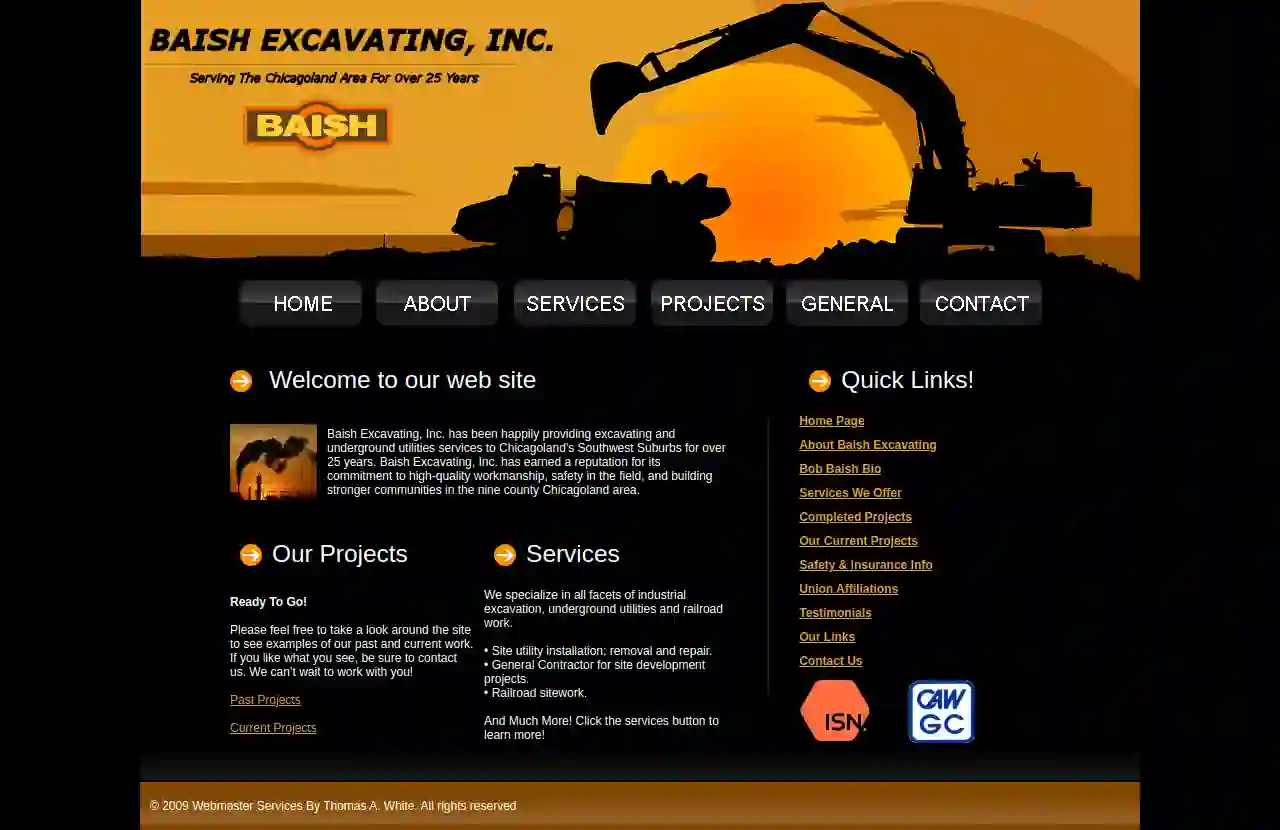
Baish Excavating, Inc.
3485-B Rt 126, Oswego, 60543, USBaish Excavating: Building Stronger Communities For over 30 years, Baish Excavating, Inc. has been a trusted name in Will County, Grundy County, and surrounding communities. A member of the Contractor's Association of Will and Grundy Counties since 1991, Baish Excavating, Inc. contributes to projects that build businesses, renovate the land and benefit the local economy. In 1985, Bob Baish founded Baish Excavating because he saw the need for high-quality excavating and underground utilities services in his community � an area that had the potential for immense residential and industrial growth. With that vision in mind, he rented a shop on Plainfield-Naperville Road in Plainfield, Illinois with a modest crew of three men (one of which was Bob�s dad, Art) and four machines. Today, the shop has upgraded in size and houses 35 pieces of machinery. The crew and staff has expanded along with the size of the workload, but the same old work ethic applies: Baish Excavating, Inc. is committed to building stronger local communities, one job at a time.
- Services
- Why Us?
- Our Team
- Testimonials
- Gallery
Get Quote
F.L. Merrill Construction, Inc.
51 reviews35 Veterans Drive, Loudon, 03275, USProudly Serving New Hampshire Since 1990. Located In Loudon, NH Family Owned & Operated NH Construction Company Get A Quote Municipal Construction We specialize in road construction for small local subdivisions. Our expertise includes building, constructing, & repairing roadways. Commercial Construction Our New Hampshire commercial construction experience includes land clearing, site work, utility installation, and more. Residential Construction Whether you need help with excavation for a new septic system or any other excavation need, our team has 25+ years of experience. Who We Are A Dedicated Team Of Construction Experts F.L. Merrill Construction's success is built on a foundation of hard work and dedication, values that are shared by everyone from upper management to construction crew members. Frank and Sue Merrill realized their ability to provide customers with a superior service comes down to their team who are consider to be an extension of their family. By investing in its people, Merrill Construction has established itself as a NH construction industry leader for over three decades. Tell us about your project! Land Clearing Site Work Utility Installation Road Construction Bridge Construction Footing Foundations Residential Excavation Materials Supply Trucking & Dumping Get A Free Quote Today! Get A Quote
- Services
- Why Us?
- Testimonials
- Gallery
Get Quote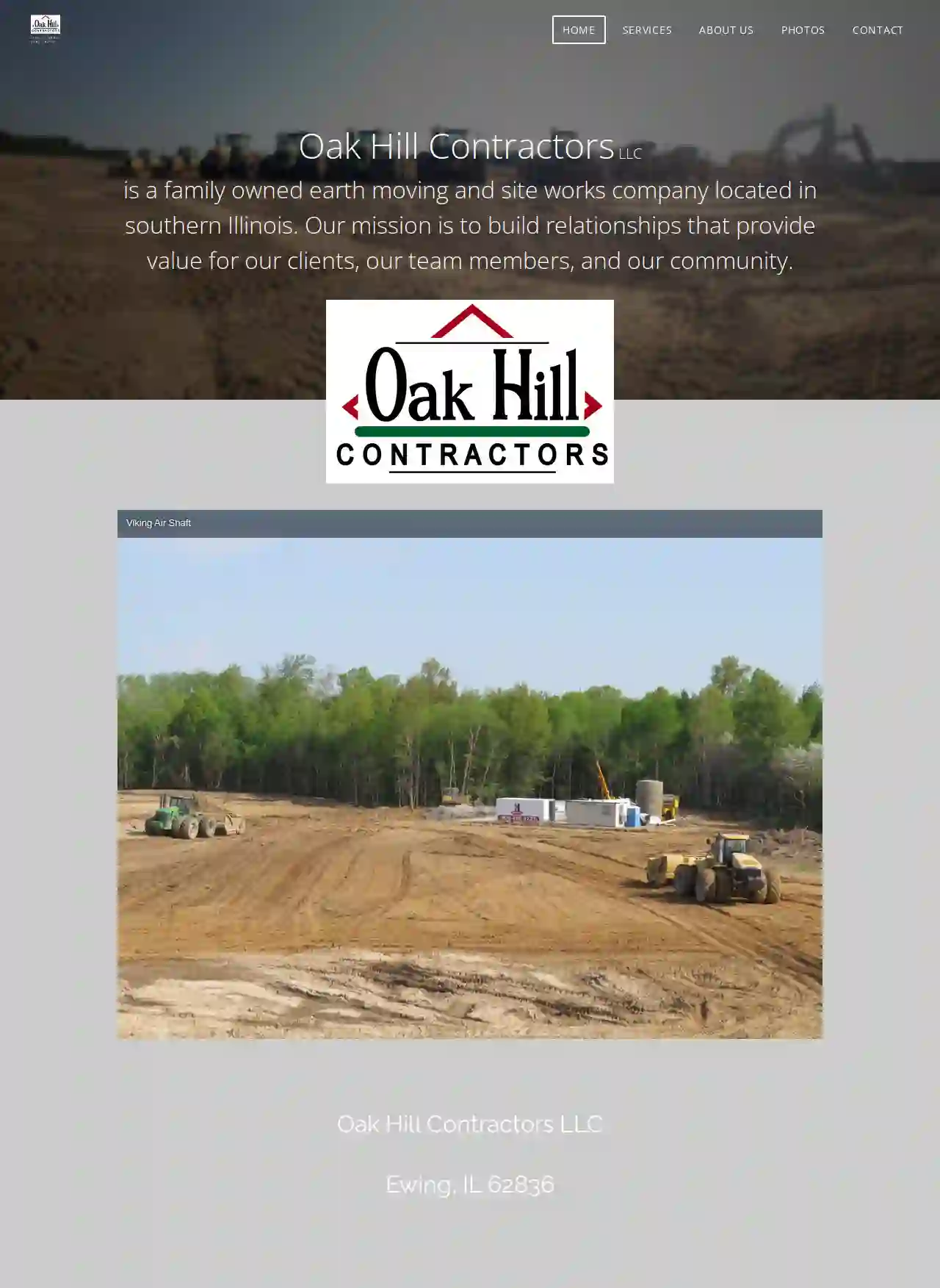
Oak Hill Contractors LLC
53 reviews20245 Ewing Road, Ewing, 62836, USAbout Oak Hill Contractors LLC Oak Hill Contractors LLC is a family-owned earth moving and site works company based in southern Illinois. We are dedicated to building strong relationships with our clients, team members, and the community, ensuring value for everyone involved. Our commitment to quality work and a wide range of equipment allows us to handle projects of all sizes. We utilize GPS-equipped machines for efficient and accurate grading work, ensuring precision and timely completion. We are proud to be Prequalified by IDOT and have MSHA-trained personnel. We are also fully insured, providing peace of mind to our clients. Take a look at one of our recent projects: Sugar Camp Refuse Expansion.
- Services
- Why Us?
- Gallery
Get Quote
McHenry Excavating, Inc
4.934 reviews1903 State Rte 31, Suite A, McHenry, 60050, USWelcome to McHenry Excavating, Inc. Commercial & Residential Demolition Pool & Concrete Removal Excavation Sewer & Water Grading Hauling & Removal Helical Piles Under-Pinning Chicagoland’s 24/7 Demolition and Excavation Experts As the Chicagoland area’s demolition and excavation experts since 2006, McHenry Excavating, Inc. is a family-owned and -operated company specializing in residential, commercial and industrial services. Serving McHenry, Lake, DuPage and Cook Counties alike, we’re also highly skilled in grading, dredging, hauling, trenching and concrete removal services. No job is too challenging for our experienced crew. Whether you have a short project timeline or a small budget to work with, give us a call to see what we can do for you. ABOUT US If We Can’t Do It, It Can’t Be Done We take great pride in providing outstanding customer service and support and have the expertise, professionalism, and experience necessary to complete every job safely and efficiently. Because we understand that no two projects are ever the same, we make it our mission to identify your every need to precisely execute your projects to your complete satisfaction. From your project’s conception to its completion, we’re there for you every step of the way! No matter how large or small, you can rest assured that you’re always in good hands when you choose McHenry Excavating, Inc. to handle your project. CONTACT US Why Choose McHenry Excavating, Inc.? Certified, Licensed & Bonded 24/7 Emergency Response Free In-Home/On-Site Estimates 100% Customer Satisfaction Reliable & Affordable Pricing Utmost Commitment to Safety No Project’s Too Large or Too Small Experienced and Trained Staff
- Services
- Why Us?
- Testimonials
- Gallery
Get Quote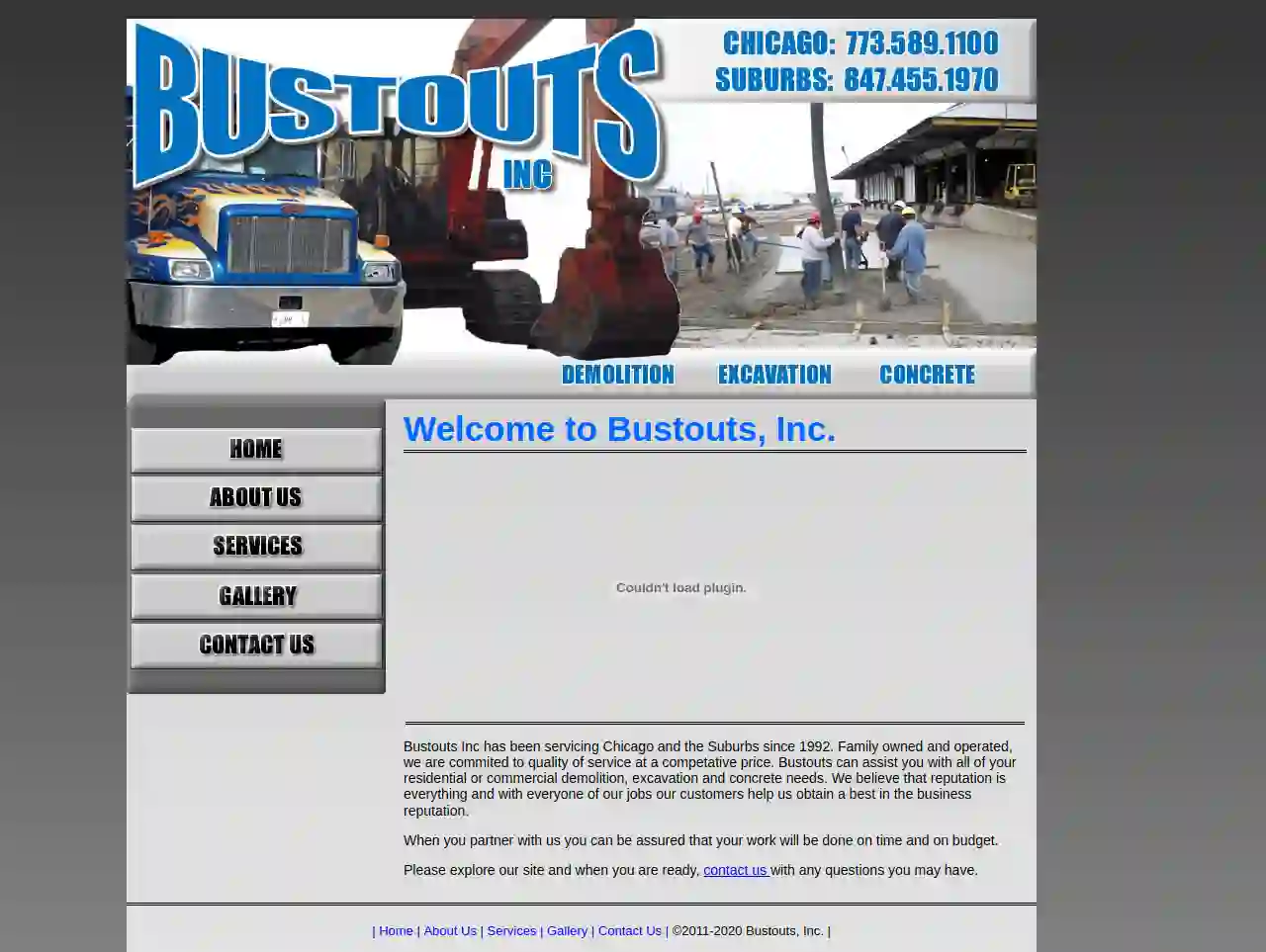
Bust Outs Inc
32 reviewsChicago, USAbout Bustouts, Inc. Bustouts Inc has been serving Chicago and the suburbs since 1992. As a family-owned and operated business, we are committed to providing high-quality services at competitive prices. We specialize in residential and commercial demolition, excavation, and concrete work. Our reputation is everything, and we strive to deliver exceptional results on every project, ensuring customer satisfaction and building a strong reputation in the industry. When you choose Bustouts, Inc., you can trust that your project will be completed on time and within budget. Explore our website to learn more about our services and don't hesitate to contact us with any questions you may have.
- Services
- Why Us?
- Gallery
Get Quote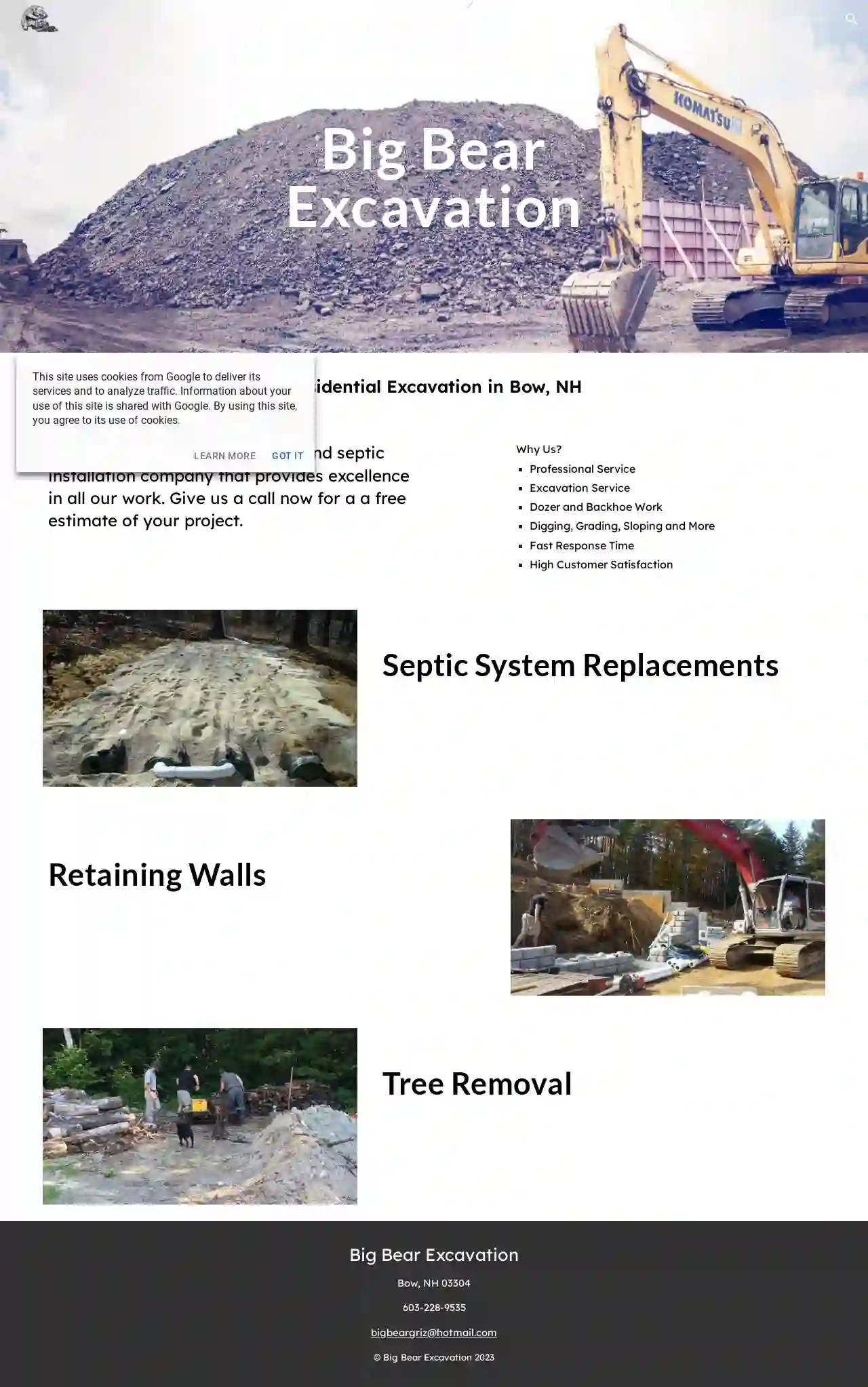
Big Bear Excavation
51 reviewsBow, 03304, USBig Bear Excavation We are a residential excavation and septic installation company that provides excellence in all our work. Give us a call now for a free estimate of your project. Why Us? Professional Service Excavation Service Dozer and Backhoe Work Digging, Grading, Sloping and More Fast Response Time High Customer Satisfaction Septic System Replacements Retaining Walls Tree Removal
- Services
- Why Us?
- Gallery
Get Quote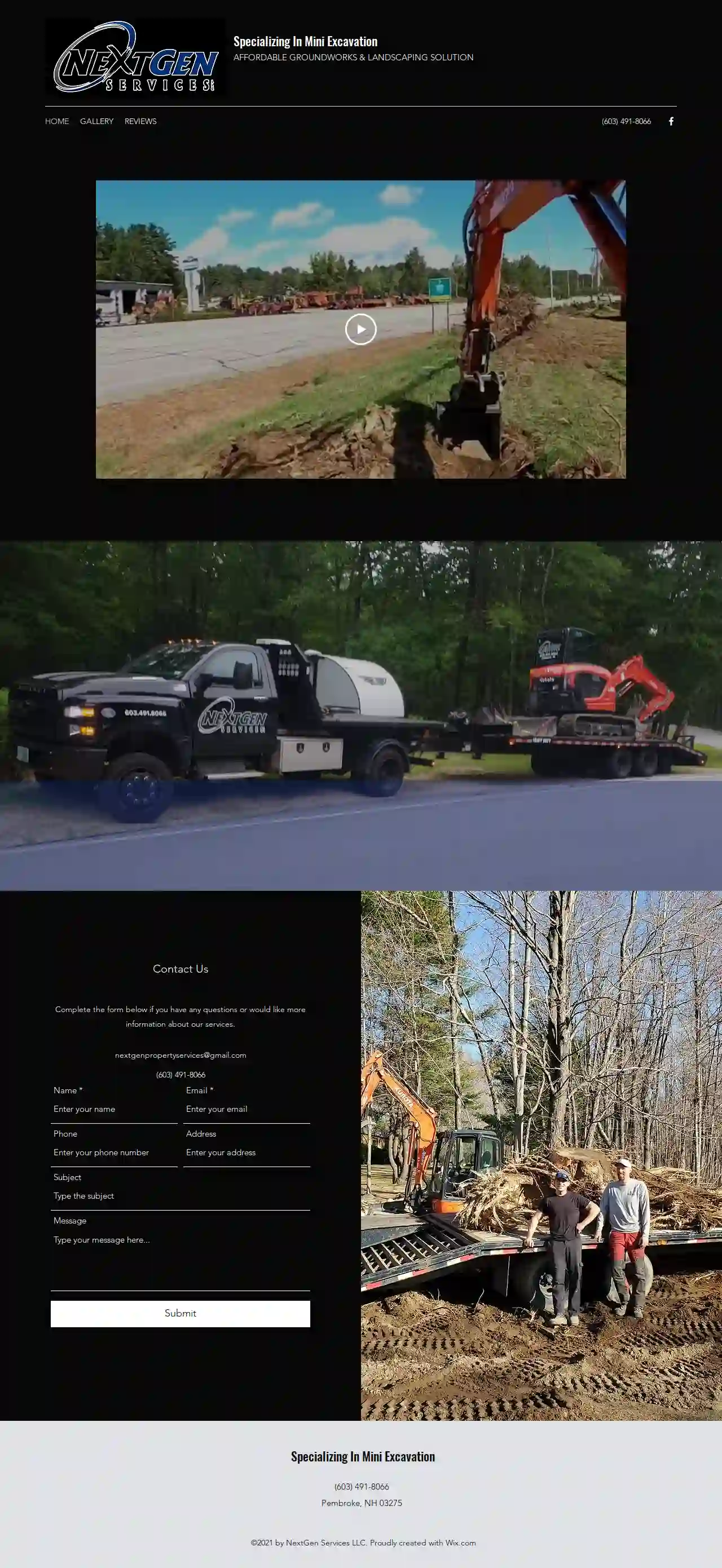
NextGen Services LLC
4.99 reviewsPembroke, 03275, USNextGen Property Services NH NextGen Property Services NH is a local business specializing in mini excavation and offering a wide range of groundworks and landscaping solutions. We are committed to providing affordable and high-quality services to our clients in Pembroke, NH and surrounding areas. Our team is dedicated to delivering exceptional results, exceeding expectations, and building lasting relationships with our clients. We take pride in our meticulous attention to detail and our commitment to customer satisfaction. Whether you need land clearing, stump removal, landscaping, parking pad construction, conduit trenching, estate cleanouts, brush removal, loam and mulch deliveries, or equipment transportation, we have the expertise and resources to handle your project efficiently and effectively. Contact us today to discuss your needs and receive a free estimate.
- Services
- Why Us?
- Gallery
Get Quote
Over 22,076+ Excavation Contractors in our network
Our excavation contractors operate in Columbia & beyond!
ExcavationHQ has curated and vetted Top Excavation Contractors in Columbia. Find a reliable business today.
Frequently Asked Questions About Excavation Contractors
- Basement Size: The larger the basement, the more excavation is required, increasing the cost.
- Soil Type: Excavating rocky or dense clay soil is generally more expensive than loose soil.
- Accessibility: Difficult-to-access sites might require specialized equipment or more labor, driving up costs.
- Foundation Type: The chosen foundation type (full basement, crawl space, slab) affects excavation needs.
- Underpinning: If underpinning (strengthening existing foundations) is necessary, it significantly increases costs.
- Disposal Fees: Hauling excavated soil to disposal sites adds to the overall expense.
- Determining Soil Suitability: Assessing whether the soil can support the intended structure or load.
- Recommending Foundation Types: Advising on the appropriate foundation design based on soil characteristics.
- Addressing Drainage and Erosion Issues: Providing solutions to manage water runoff and prevent erosion.
- Evaluating Slope Stability: Assessing the risk of landslides or soil movement on slopes.
- Building on challenging soil types (expansive clay, loose sand, etc.)
- Constructing large or complex structures
- Excavating near slopes or retaining walls
- Addressing drainage or erosion concerns
- Experience: Choose contractors with a proven track record and years of experience in excavation projects similar to yours.
- Licensing and Insurance: Verify that they are properly licensed to operate in your area and carry adequate insurance to protect you from liability in case of accidents or damage.
- Equipment and Resources: Ensure they have the necessary equipment and resources to handle your project efficiently and safely.
- Positive Reviews and References: Check online reviews and testimonials from previous customers. Request references and contact them to inquire about their experience with the contractor.
- Professionalism: Opt for a company that communicates clearly, provides detailed and transparent estimates, and has a responsive and courteous team.
- Excavations Deeper Than a Certain Depth: This varies by jurisdiction, usually around 5 feet.
- Excavations Near Utilities: Digging near buried utilities (gas, water, electric) often requires permits and utility locates to prevent damage.
- Excavations Affecting Public Property: Projects impacting sidewalks, roads, or other public areas typically require permits.
- Excavations in Environmentally Sensitive Areas: Projects in wetlands, floodplains, or other sensitive areas might need special permits.
How much does it cost to excavate a basement?
What is a soil engineer, and do I need one?
How do I find a good excavation contractor?
Do I need a permit for excavation?
How much does it cost to excavate a basement?
- Basement Size: The larger the basement, the more excavation is required, increasing the cost.
- Soil Type: Excavating rocky or dense clay soil is generally more expensive than loose soil.
- Accessibility: Difficult-to-access sites might require specialized equipment or more labor, driving up costs.
- Foundation Type: The chosen foundation type (full basement, crawl space, slab) affects excavation needs.
- Underpinning: If underpinning (strengthening existing foundations) is necessary, it significantly increases costs.
- Disposal Fees: Hauling excavated soil to disposal sites adds to the overall expense.
What is a soil engineer, and do I need one?
- Determining Soil Suitability: Assessing whether the soil can support the intended structure or load.
- Recommending Foundation Types: Advising on the appropriate foundation design based on soil characteristics.
- Addressing Drainage and Erosion Issues: Providing solutions to manage water runoff and prevent erosion.
- Evaluating Slope Stability: Assessing the risk of landslides or soil movement on slopes.
- Building on challenging soil types (expansive clay, loose sand, etc.)
- Constructing large or complex structures
- Excavating near slopes or retaining walls
- Addressing drainage or erosion concerns
How do I find a good excavation contractor?
- Experience: Choose contractors with a proven track record and years of experience in excavation projects similar to yours.
- Licensing and Insurance: Verify that they are properly licensed to operate in your area and carry adequate insurance to protect you from liability in case of accidents or damage.
- Equipment and Resources: Ensure they have the necessary equipment and resources to handle your project efficiently and safely.
- Positive Reviews and References: Check online reviews and testimonials from previous customers. Request references and contact them to inquire about their experience with the contractor.
- Professionalism: Opt for a company that communicates clearly, provides detailed and transparent estimates, and has a responsive and courteous team.
Do I need a permit for excavation?
- Excavations Deeper Than a Certain Depth: This varies by jurisdiction, usually around 5 feet.
- Excavations Near Utilities: Digging near buried utilities (gas, water, electric) often requires permits and utility locates to prevent damage.
- Excavations Affecting Public Property: Projects impacting sidewalks, roads, or other public areas typically require permits.
- Excavations in Environmentally Sensitive Areas: Projects in wetlands, floodplains, or other sensitive areas might need special permits.